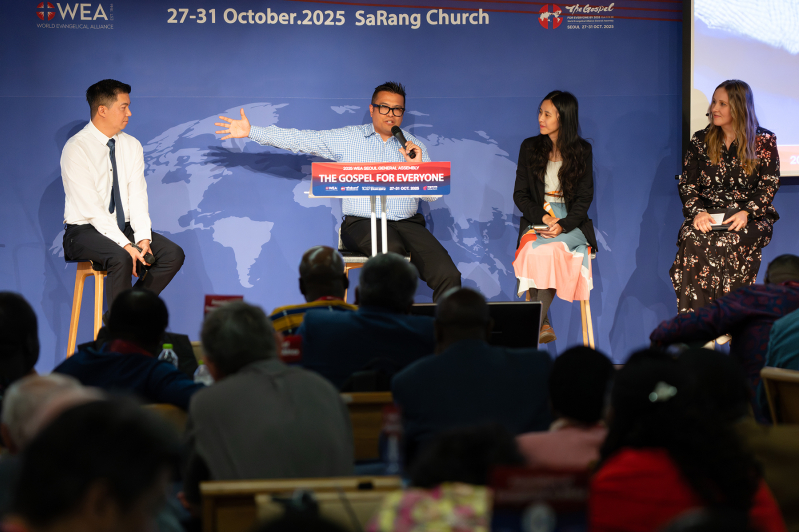
The World Evangelical Alliance turned its attention to what one speaker called “the defining public health crisis of our time” as the third panel on the third day of the WEA General Assembly in Seoul focused on mental wellness and how the global church can respond to rising anxiety, loneliness and performance-driven Christianity.
Moderated by New York-based pastor, author and ethicist Sam D. Kim, the session brought together Kimberli Cook, assistant director of the Hendricks Center and adjunct faculty in theological studies and counseling ministries at Dallas Theological Seminary; Romans Ten (Bernie), founder of ReachConf; Andrew Feng, chief program officer at IFI Partners; and Charis Chow, co-founder of ShukShuk in Singapore.
Kim opened the discussion with both humor and urgency, saying the church is ministering in a “confounding duality”: “We have more medicine but less wellness. We’re the most connected, wired, linked-in human history, yet more polarized, disconnected and lonelier than ever.”
Crisis of connection, not only of health
Kim argued that what is often labeled a global mental health crisis is in many cases a symptom of a deeper social and spiritual disruption — the loss of community and the rise of what he called “the modern epidemic of superficiality.”
“Increasing social isolation and loneliness are tearing apart the very fabric of what makes us human,” he said, noting that constant digital engagement is forming people less by the imago Dei and more, as he put it, by the “imago TikTok.”
Referencing the well-known line “Hurry is not of the devil; hurry is the devil,” Kim said the church’s most urgent contribution may not be more innovative strategies but “a return to simplicity.”
“If the god of this age is productivity and efficiency is what we worship, then ultimately what we sacrifice on the altar are our relationships,” he said. “The greatest call of our time is not productivity but presence.”
Kim linked the theme to the Assembly’s wider evangelistic goal — taking the gospel to everyone by 2033 — saying that a church that slows down, looks people in the eye and restores belonging “is precisely the church that will be credible in its witness.”
Digital connection can flatten human dignity
Cook, speaking after Kim, said that one of the paradoxes of the current ministry environment is that church leaders’ faces “are going on screens all over the world,” phones are buzzing “with updates,” and yet “rates of depression, anxiety and even suicide keep rising.”
“Could I suggest that even though it is an incredible tool, there is something inhuman about digital connection with each other?” she asked. “It keeps us living on the surface, less attentive to ourselves, less present with one another and less secure in our own worth.”
She emphasized that Scripture locates human value not in reach, likes or platforms but in humanity’s status as image bearers of God. That, she said, must become the starting point for Christian approaches to mental wellness.
“Online, people become avatars, algorithms and arguments,” Cook said. “Instead of seeing the richness of a human soul, we end up just kind of scrolling through curated fragments. No wonder we feel unseen, undervalued and unwell.”
Cook urged participants to “slow down enough to actually look at a person on a screen or the person in the mirror and remember: this is an image bearer of God.”
Hidden pressures: performance, perfection and “placelessness”
Feng, who has worked for decades with international students and diaspora communities, said the mental wellness challenges are particularly acute for globally mobile young adults. Every year, he noted, roughly 7 million international students cross borders in search of a better future, “and over 1 million come from China alone.”
“They are some of the most connected people in the world, yet some of them quietly carry loneliness and anxiety,” he said. Studies among Chinese international students, he added, show depression and anxiety symptoms in the 70–75 percent range.
Feng identified three “invisible pressures”: performance pressure from families and host cultures; perfection projection, the desire “to be well known rather than known well”; and placelessness, “the belonging of nowhere.”
“When your passport, your platform and your purpose all feel temporary, their home becomes more of a hope than a place,” he said. He called this “digital displacement — connected everywhere but rooted nowhere.”
For churches and alliances, Feng said, the crisis is not only mental health but “an erosion of meaning and belonging.” The opportunity, he added, is for the church to become “not just a ministry, but family — a community where people are no longer chasing being well known, but finally are being known well.”
A vast, overlooked field: 3 billion gamers
Bringing in a very different mission field, Romans Ten described the scale and intensity of digital spaces where many young people spend several hours daily — especially gaming and livestreaming.
“There are 3 billion souls that play video games every day for a couple hours — and we’re not there,” he said. “One in three high schools in the U.S. has an e-sports program. I’d venture to guess it’s one in probably 20,000 churches doing anything in gaming.”
He illustrated how massive gaming audiences have become: influencers can attract hundreds of thousands to a million viewers a night, run multi-hour streams, even raise millions of dollars in weeks — all in spaces that often go unseen by church leaders.
His appeal to the Assembly was simple: “Just taste and see what’s happening. Take it back home in your own context and reach the 3 billion that game, in a way that they can meet Jesus.”
For mental wellness, he implied, part of the solution is for the church to stop ignoring the digital habitats where younger generations actually live, build community and seek affirmation.
Gen Z pressure: doing instead of being
Chow, who works with emerging Christian leaders in Singapore, said the young adults she disciples often internalize “the idea that what we are is what we produce.” Online culture, she noted, is full of “spend a productive 5 a.m. morning with me” videos.
“Rest just becomes another thing we try to schedule,” she said. “Even healing becomes something we try to achieve. Even in Christian spaces, it can show up as spiritual productivity — we are told to do more for God and be better.”
But, she added, “we’re always in the process of becoming someone, but rarely at peace being someone who is loved.” That replacement of being with doing, she said, is “the unseen pressure behind much of our anxiety.”
Chow described a simple model her network uses in Singapore: no brand, no structure, “just relationship.” Young believers gather to pray, ask one another for their stories, and practice “beholding the image of God in one another.”
“In a world that has become so hurried and transactional, maybe the most countercultural thing the church can do is to slow down and really see one another again,” she said. “What I believe, as the younger generation, is that we are not maybe craving more solutions, but more soulful presence.”
From productivity to presence
Throughout the panel, Kim kept returning to the contrast between a hurried, efficiency-driven culture and the way Jesus practiced ministry.
“Jesus was never in a hurry,” he said. “He was either going to a meal or coming from a meal. Deliberate, unhurried time was Jesus’ primary missional strategy.”
If the world is “fractured by hurry and loneliness,” Kim said, then koinonia — biblical fellowship that sees, listens and remains present — “is the only way to save the world.” Churches that recover unstructured time, second-breakfast conversations and a ministry of presence, he said, will be better equipped to speak the gospel into anxiety, burnout and isolation.
Cook agreed that mental wellness is “directly linked to whether or not we are connected with our purpose.” When believers feel they are wandering, or “trying to fulfill somebody else’s purpose for their life rather than the one God has wired them for,” she said, anxiety and depression will eventually surface.
“In this cultural moment,” Kim said at the start, “we are at the precipice of harnessing the power of a superior intelligence to generate AI — yet we are also at the brink of communal poverty. Like the tower of Babel, we may touch the sky, but we find our relationships scattered.” The task of the church, the panel concluded, is to close that gap with the gospel, presence and community.
Click here for CDI's full reporting from the WEA General Assembly.






